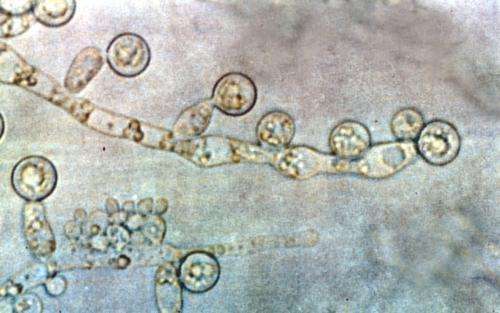New approach could overcome fungal resistance to current treatments

Current medications aren't particularly effective against fungi. The situation is becoming more challenging because these organisms are developing resistance to antimicrobial treatments, just as bacteria are. Now, researchers report in ACS Infectious Diseases that they have identified compounds that tackle these infections in a new way—by interfering with fungal enzymes required for fatty acid synthesis—potentially opening the door to better therapies.
Superficial infections by Candida or other types of fungi can cause irritating but relatively minor conditions such as oral thrush and athlete's foot, but invasive infections can result in debilitating and deadly diseases such as cryptococcal meningitis and some hospital-acquired infections. More people are getting these infections because of the growing use of invasive surgery, implanted catheters and immunosuppressive therapy. And some patients, such as those with severe COVID-19 or HIV, are especially susceptible to fungal infections. In addition, treatments can be toxic and often don't work, in part because of increasing resistance. Current targets for these compounds include molecules necessary for making fungal cell walls. As an alternative, Glen. E. Palmer and colleagues began looking for potential therapies that could work through a different mechanism and thereby avoid the drawbacks of these drugs.
The researchers zeroed in on fungal fatty acid (FA) synthase and desaturase enzymes, which are essential for the growth and virulence of human fungal pathogens. It's been difficult to devise a rapid chemical assay to find inhibitors for these enzymes, since it's hard to isolate the enzymes. So the team instead combined genetic engineering with a whole-cell assay to screen thousands of small molecules. Although none of the tested compounds blocked FA synthase activity in Candida albicans cell cultures, 16 inhibited FA desaturase activity. A core acyl hydrazide structure was found to be key to the activity of several of these molecules, which were effective even against drug-resistant strains of several infectious species of fungi, while showing little to no toxicity to mammalian cells. The researchers note that these compounds are promising leads for further development as antifungal agents.
More information: Identification of Inhibitors of Fungal Fatty Acid Biosynthesis, ACS Infectious Diseases, DOI: 10.1021/acsinfecdis.1c00404
Provided by American Chemical Society



















